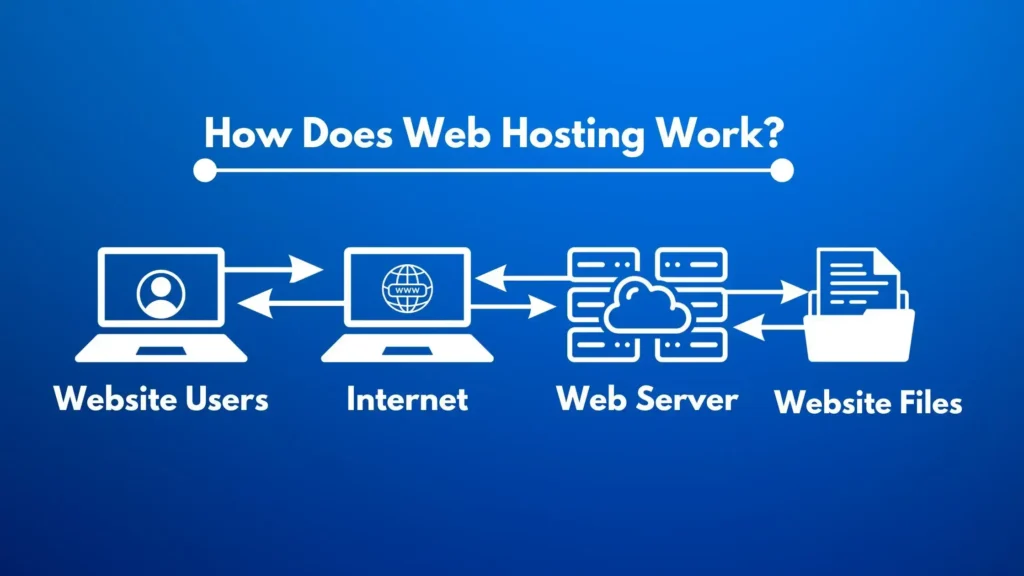
Welcome to our ultimate guide to website Hosting! If you’re here, you’re likely starting a journey in the online world, and like any journey, it’s crucial to have a good home base. For your website, and that home base is your hosting service.
Choosing the right hosting plan is crucial for the success of your online business. It’s much like choosing a good location for a physical store. Because your hosting service determines the accessibility, speed, and security of your website, these factors contribute significantly to the user experience.
In this beginner-friendly guide, we’ll demystify the concept of website hosting. We’ll take you through the basics and help you understand which hosting plan best suits your needs. So, let’s start your web journey on the right foot!
Best Website Hosting Providers [Expert’s Choice]
If you have no time to read the full article, we have curated a list of top hosting providers for your convenience. Each provider meets high standards of quality and reliability. Explore these options and choose the one that suits you best.



What is Web Hosting?
Website Hosting is a service offered by hosting companies that involves storing your website’s files and delivering them to visitors’ browsers when your domain name is entered into the address bar. This fundamental function is key to getting your website online and accessible to users.
How Does web hosting work?

As mentioned earlier, web hosting is like renting a piece of land on the internet. In this analogy, the land is represented by a server, and just as you build your house on the land, you host your website on the server.
Once you have hosted your website on the server, it becomes accessible online. When someone visits your website, their device sends a request to the server. The server then responds to these requests, delivering your website files to the user’s browser.
The main question is how to upload our website on hosting servers. This can be achieved by using FTP (File Transfer Protocol) to transfer files between your computer and the server. While FTP may sound complex, it is simply a method to facilitate file transfer. Once the files are uploaded, the hosting provider takes care of the rest, ensuring your website is ready for visitors.
Types of web hosting: which one is right for you?
Now you know about web hosting and how it works, but this amount of information is not enough. It’s also essential to understand that there are different types of website hosting available in the market, catering to different needs.
Let’s explore these hosting options and discover their unique features and benefits.
Shared Hosting
Shared Hosting is the most economical choice because you share server space with other users, lowering costs. However, the downside is that you also share resources. Your site might load slower if other sites are using a lot of resources.
On the other hand, it is ideal for small businesses or personal blogs in their early stages with limited traffic [less than 50,000/month]. In simple words, it’s excellent for beginners with light traffic needs.
Virtual Private Server (VPS) Hosting
VPS hosting is a step up from shared Hosting. Although you share a server with other websites, you have a dedicated portion of the server’s resources.
This gives you more control and better performance when compared to shared Hosting, and your site can handle more traffic. This is a good choice for growing businesses with more website traffic.
Dedicated Hosting
With dedicated Hosting, you get an entire server exclusively for yourself. This gives you complete control over the server configuration and access to all resources. It’s like having your own private island in the vast sea of the internet.
This option is ideal for large businesses or high-traffic websites requiring maximum performance, security, and scalability. The downside of Dedicated Hosting is that it is more expensive and requires technical expertise to manage it effectively.
Cloud Hosting
Cloud hosting is a modern web hosting option where your site is stored on multiple servers in the cloud. This means that your website can handle high amounts of traffic without slowing down.
This hosting is an excellent choice for businesses that are growing and need flexibility with their Hosting. With cloud hosting, you only pay for the space you need at any given time. It’s a simple and cost-effective solution for newbies in the hosting world.
Managed Hosting
With managed Hosting, you get a team of experts who take care of all the technical aspects of your website by your hosting provider. So that you can focus on creating content and running your business without worrying about server maintenance.
While this option benefits those with limited technical knowledge, it can be costly in some cases due to the extensive support and services it offers.
Key Features to Consider When Choosing a Website Hosting Provider
Choosing the right website hosting provider is as important as deciding on the type of Hosting. There are many hosting providers, each with different plans, features, and benefits.
When selecting a provider, it’s essential to identify the key elements that a reliable hosting service should offer. These features are crucial for ensuring that your website runs smoothly, is secure, and provides an excellent user experience. Let’s take a closer look at these essential features and understand them better.
When searching for a reliable hosting provider, consider these key features. They’ll help you find the one that aligns best with your needs and growth plans. Evaluating these features saves time and ensures a smooth hosting experience.
Which Type of Hosting is Best for Beginners?
When it comes to cost-effectiveness, Shared Hosting is the most affordable choice for beginner. As the name represents, you share server resources with other websites in this type of Hosting, which keeps costs down. However, high traffic on other websites may affect your site’s performance since resources are shared.
If you’re just starting, there’s no need to worry too much. Remember, if your website succeeds, you can always upgrade your hosting plan.
As previously mentioned, the location of the servers is crucial for your website’s performance. Opting for a server closer to your target audience ensures faster data retrieval and quicker loading times. Therefore, when selecting a hosting provider, make sure to choose one with servers located closest to your audience.
Lastly, consider your website’s capacity. If your site is expected to grow rapidly or handle high amounts of traffic, you might want to look into VPS or Dedicated Hosting. These options offer more resources and better performance but at a higher price.
In conclusion, for beginners, a balance between cost and performance would be ideal. Shared Hosting could be the right choice to start with.
Finding Your Competitor’s Website Hosting Provider
Sometimes, you may find yourself curious about the hosting provider used by a particular website. Fortunately, it is pretty simple and easy to find out.
There are many tools available online that can help you determine a website’s hosting provider, such as Whois Lookup and IP Lookup.
Using these tools, you can enter the URL or IP address of the website and get information about their hosting provider. This is useful for many reasons, including assessing competitors’ hosting services, finding alternative options for your own site, or simply satisfying curiosity.
Well, here is a step-by-step guide on how to identify a website’s hosting provider:
FAQ
What is website hosting?
Web hosting is the foundation of your website. Just like your home needs land, your website needs a space on the internet. Web hosting is like renting a place to store all the files and data that make up your website. It provides a secure and reliable space for your website to live and be accessible to visitors.
Who are the best website hosting providers?
The best website hosting provider often depends on your specific needs. However, some popular and reliable choices include Hostinger, BlueHost, and Chemic Cloud.
How much does website hosting cost?
The price of website hosting can vary significantly, depending on factors such as the type of Hosting (shared, VPS, dedicated), the specific features required, and the chosen hosting provider. Hosting costs can range from a few dollars per month to well over a hundred dollars per month.
What are the different types of website hosting?
There are several types of website hosting, including
- Shared Hosting
- Virtual private server (VPS) Hosting
- Dedicated Hosting
- Cloud hosting
- Managed Hosting
Choosing the right hosting provider is very crucial for your website’s success. Consider factors like cost, speed, server location, and scalability when making your decision. Start with a Shared Hosting plan if you’re new to Hosting, and upgrade as your site grows.
Furthermore, finding any website’s hosting provider is easy by using Free online tools like HostingChecker, Whois Lookup, or IP Lookup. Utilize this knowledge to compare competitors’ hosting services and find the best option for your own site.
Lastly, if you have any questions about website hosting, refer to our FAQ section above. We hope that this article has helped you gain a better understanding of website hosting and the essential factors to consider before choosing a provider.

